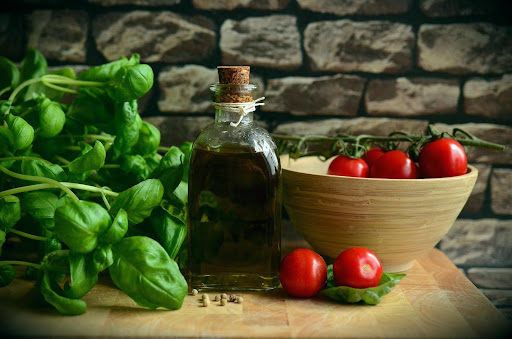It is commonly believed that incorporating olive oil into one’s diet can have significant health benefits. However, it is important to understand the nutritional properties and health advantages of this oil in detail. The objective of this article is to provide a comprehensive analysis of the subject matter, while also addressing any misconceptions surrounding the use of olive oil. In doing so, we aim to offer scientifically-backed recommendations on how to effectively integrate this oil into your diet for optimal health outcomes.
Table of Contents
What is Olive Oil?
Olive oil is obtained from the fruit of the Olea europaea tree, native to the Mediterranean region. There are several types of olive oil, with extra virgin olive oil (EVOO) being the highest quality and most nutritionally rich. EVOO is obtained through a cold-pressing process without the use of chemicals or heat, ensuring that the oil retains its natural flavors and health-promoting compounds.
Nutritional Profile of Olive Oil
Olive oil is predominantly composed of monounsaturated fatty acids (MUFAs), particularly oleic acid, which accounts for 55-83% of its fatty acid composition. MUFAs have been associated with various health benefits, including reduced inflammation and improved heart health. Did you know that olive oil has polyphenols that act as strong antioxidants to safeguard cells from oxidative damage?
Health Benefits of Olive Oil
- Heart Health: Tons of academic studies have shown that consuming olive oil can reduce the risk of heart disease by lowering levels of low-density lipoprotein (LDL) cholesterol, increasing high-density lipoprotein (HDL) cholesterol, and improving blood vessel function A meta-analysis of 32 cohort studies found that a higher intake of MUFAs, primarily from olive oil, was associated with a reduced risk of coronary heart disease .
- Anti-inflammatory Effects: Olive oil contains several bioactive compounds, such as oleocanthal, which have been shown to possess anti-inflammatory properties similar to those of ibuprofen. Chronic inflammation is a leading cause of numerous chronic illnesses, such as heart disease, diabetes, and cancer.
- Antioxidant Properties: Did you know that olive oil is not only a tasty addition to your meals but also a rich source of polyphenols? These polyphenols act as powerful antioxidants, helping to protect your cells from oxidative damage. This means that consuming olive oil regularly can have numerous health benefits, including lowering your risk of chronic diseases such as heart disease and cancer. So next time you’re cooking, consider reaching for a bottle of olive oil for more than just its delicious flavor. Oxidative stress has been involved in the development of different chronic diseases, including cancer, cardiovascular diseases, and neurodegenerative disorders.
- Regulation of Blood Glucose: Research suggests that the monounsaturated fats (MUFAs) found in olive oil could assist in managing blood glucose levels and improving the response to insulin. This, in turn, may decrease the risk of being diagnosed with type 2 diabetes.
- Cognitive Function: It has been suggested that including olive oil in your diet may protect your brain and improve cognitive function. A study conducted on older adults found that those who followed the Mediterranean diet, which includes olive oil, showed promising results. Mediterranean diet, rich in olive oil, had a lower risk of developing Alzheimer’s disease.
Debunking Misconceptions
Despite the mounting evidence supporting the health benefits of olive oil, some misconceptions persist. One of the most common concerns is the oil’s high caloric content. While it is true that olive oil is calorie-dense, moderation is key. When used judiciously, olive oil can be a healthy addition to your diet without significantly increasing your calorie intake.
Another misconception is that heating olive oil destroys its health benefits. While high temperatures can cause a breakdown of some beneficial compounds, research has shown that EVOO maintains its antioxidant properties even after being heated to normal cooking temperatures.
Incorporating Olive Oil into Your Diet
To maximize the health benefits of olive oil, it is important to choose high-quality EVOO and store it properly. Look for dark glass bottles or tins that protect the oil from light and heat, which can degrade its quality.
In order to maximize the advantages of olive oil in promoting good health, it is essential to carefully choose high-quality extra virgin olive oil (EVOO) and utilize it appropriately in your everyday eating routine. Below are a few important guidelines to consider when selecting, storing, and integrating olive oil into your meals.
- Selection: When shopping for olive oil, look for “extra virgin” on the label, as this is the highest quality grade. Pay attention to the harvest date, as fresher oils generally have better flavor and nutritional value. Consider opting for oils that have been certified by reputable organizations such as the International Olive Council (IOC) or the North American Olive Oil Association (NAOOA), which ensure that the oil meets quality standards.
- Packaging: Choose olive oil packaged in dark glass bottles or tins, which protect the oil from exposure to light and heat. Both of these factors can degrade the oil’s quality, leading to a loss of flavor and nutritional value. Avoid purchasing olive oil in clear glass or plastic containers.
- Storage: To maintain the quality and lengthen the shelf life of olive oil, it is advisable to store it in a cool and dark location, away from direct sunlight and heat-emitting appliances like ovens or stovetops. By doing so, you can preserve its freshness. Additionally, once the bottle is opened, it is recommended to consume the oil within a few months to retain its optimal taste and freshness.
- Cooking: Olive oil can be used in a variety of cooking methods, including sautéing, grilling, roasting, and baking. While it’s true that EVOO has a lower smoke point than some other cooking oils, it can still be safely used for most cooking applications at temperatures below 410°F (210°C). For higher heat cooking, consider using a more heat-stable oil like avocado oil or refined olive oil.
- Drizzling and Dressings: One of the simplest ways to incorporate olive oil into your diet is by using it as a finishing touch on dishes. Drizzle it over cooked vegetables, salads, pasta, or grilled fish for a burst of flavor and added nutrition. You can also make your own salad dressings by whisking together EVOO with vinegar, lemon juice, or other acidic ingredients, along with your choice of herbs and seasonings.
- Replacing Unhealthy Fats: Consider replacing unhealthy fats like butter or margarine with olive oil in recipes. For instance, you can use olive oil as a spread on toast, or in place of butter for sautéing vegetables. Keep in mind that while olive oil is a healthier option, it’s still calorie-dense, so use it in moderation.
By following these tips, you can easily add olive oil to your diet. Not only will you enjoy its rich flavor, but you’ll also reap its numerous health benefits.











